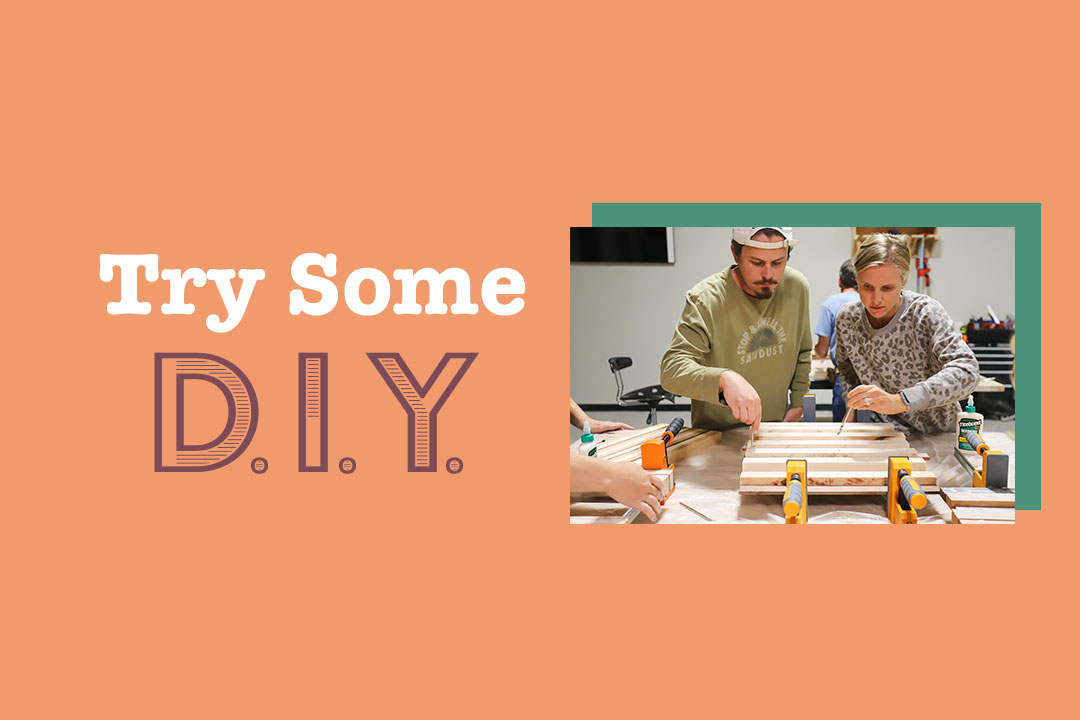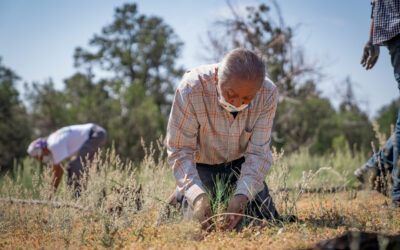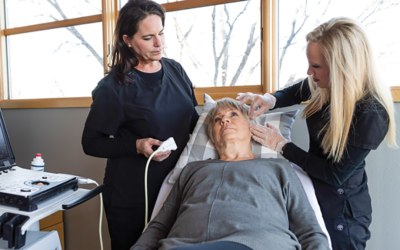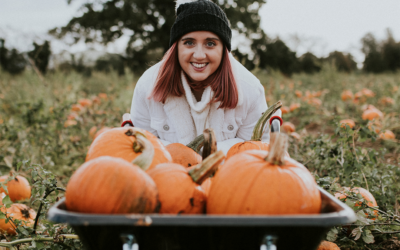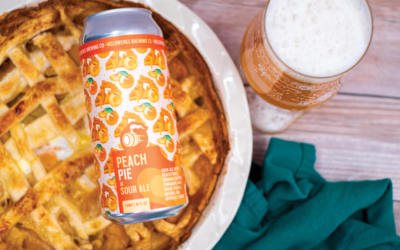All the extra time spent at home these last few years has led to a rekindled interest in learning new skills. Whether that be trying new recipes in the kitchen, building things in the garage or getting our hands dirty in the garden, we have largely relied on the internet to find our way—until now. These local businesses are showing us that nothing compares to real-life instruction and hands-on experience by helping us take our newfound DIY skills to the next level.
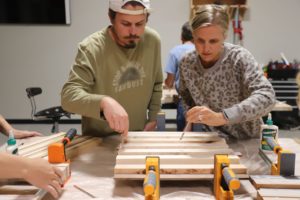
Shane Thomas and co-worker Kiersten gluing a cutting board at Maker’s Bench in November 2021. Photo courtesy of Maker’s Bench Community Workspace.
Maker’s Bench Community Workspace
Woodworking is one hobby that many have attempted, from Pinterest-inspired creations to home renovations on the honey-do list. However, there were few opportunities for aspiring craftsmen to learn the trade in a fully equipped shop setting until Timnath hobbyists Pete, Cheryl and Shane Thomas opened Maker’s Bench Community Workspace last November.
“The biggest hurdles for people who want to get into woodworking are often a lack of space and access to the right tools, plus the intimidation factor of operating different equipment,” says Shane, Maker’s Bench co-owner and son of Cheryl and Pete. “We make woodworking accessible to anyone and provide the education they need to safely build whatever they want.”
Maker’s Bench offers community classes for all skill levels, including classes on how to make cutting boards, resin charcuterie boards and seasonal projects, like planter boxes in the spring, as well as classes for private groups. All the classes are taught by Pete, Cheryl and Shane, as well as Seth Gustin, a woodworking professor at Red Rocks Community College whose expertise makes him a great resource for more complex projects.
For people who want to work independently, Maker’s Bench also offers memberships and hourly passes that grant them access to the shop space and all the equipment they need during open hours. Memberships cost anywhere from $110-500 per month, depending on how much time members want to spend in the shop, and two-hour passes are available for $50 with discounts on pass bundles. Members also get discounts on classes if they wish to take them.
Before accessing their workspace, members are required to take a safety class in order to learn how to use the different tools, which include a planer, jointer, drill press, hole machine, sanders and saws. Wood and other materials are also available at an additional cost—which are sourced from local Maker’s Bench partners Woodcraft (in Loveland), Sears Trostel and Baldwin Hardwoods (in Fort Collins)—so members can skip the trip to Home Depot.
“Part of the reason we decided to offer memberships was to create a woodworking community where people can bounce ideas off one another and just have fun,” says Cheryl. “Not only does a membership give them the opportunity to work alongside others who are passionate about building things, but they also have the space, materials and specialized equipment to create things they wouldn’t be able to in their garage.”
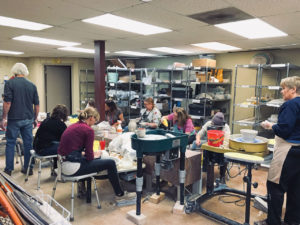
Guild members make bowls for the Empty Bowls fundraiser event. Photo courtesy of Northern Colorado Potters’ Guild & Studio.
Northern Colorado Potters’ Guild & Studio
The Northern Colorado Potters’ Guild & Studio was founded in 2005 when a group of local potters created a space to gather and throw. As interest grew, more members joined the guild and community classes became available for anyone who wants to take the wheel.
Classes take place over the course of eight weeks with one two-and-a-half-hour session per week. With your $210 registration comes a 25-pound bag of clay and all firing costs, including the glaze and kiln time, plus access to any tools and other materials available at the studio. Students also have five hours of lab time per week, so they can work independently outside of class at the guild.
Instructors demonstrate pottery techniques such as centering, throwing, trimming and glazing, as well as more advanced techniques. Plenty of help is provided, but this isn’t your guided painting class where everyone makes the exact same thing.
“People of all skill levels take our classes, and some of them might be more interested in making mugs or bowls or vases, so we don’t limit them to a certain type of project,” says class chairperson Cydney Johnson. “There’s a lot of room for creativity—you can use different kinds of clay, create unique textures and experiment with all sorts of glazes. We teach the techniques and really let you make it your own.”
Anyone can also become a member of the guild and gain full-time access to the studio, even in the middle of the night. A membership gets you two shelves to store your pottery at the guild, but you are required to bring your own tools, buy your own clay and pay an additional firing cost, which includes dozens of different glaze choices and facility assistants who load the kilns.
Johnson says one of the biggest perks of becoming a guild member is making connections and getting inspired by others’ work: “Being around other artists is huge when you’re getting into a hobby like this. You get tons of ideas from other potters, and they are always happy to talk about what they’re doing and be a source of inspiration. Pottery is harder than it looks, so just keep trying and don’t give up.”
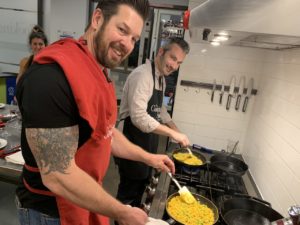
Students stir cous cous while learning to make a dinner of spiced lamb T-bone, cous cous, tomato jam and yogurt. Photos courtesy of The Cooking Studio.
The Cooking Studio
While most people are able to fry an egg, how many of us have taken the time to learn a new skill in the kitchen? At The Cooking Studio in downtown Fort Collins, anyone can master the art of pasta making, dough kneading, spice mixing, knife techniques and more, all while making a delicious meal to share with friends and family.
The Cooking Studio was founded in 2015 when owner Trish O’Neill decided to turn her passion for cooking into a community culinary experience: “I wanted to create a place for people to come and cook together while learning different techniques from local chefs. Anybody can watch cooking shows and follow a recipe, but until you actually hear the sizzle and smell the burnt almonds, you haven’t truly experienced cooking.”
Everyone gets their hands dirty at each cooking station, and no one gets the recipe until after they’ve made the meal. That way no one gets caught up on vague instructions like “stir quickly” or “bake until light brown”—they work together and rely on the chef’s instruction to know just how quickly to stir or how long is long enough in the oven.
Cooking classes are available for a range of different cuisines, such as Thai, Indian or fancy French, and students make three or four courses, including an appetizer, entree and dessert. In the baking classes, students make three or four different items as well, and not all of them are desserts. Community classes are open to anyone, even kids, and are a great way to meet other couples, families and aspiring chefs.
Team bonding nights are also popular at The Cooking Studio, where friends, family and work groups can book private times to cook alongside one another. O’Neill says book clubs have signed up to “cook the book” and curate a menu based on the types of food in their latest read. Couples regularly come for “date night” to put their skills—and relationship—to the test.
“The private groups are fun because people can really get creative with the menu and share that experience together,” she says. “And if you mess up, it’s no big deal. Just like the invention of the molten lava cake: If you can’t fix it, rename it.”


